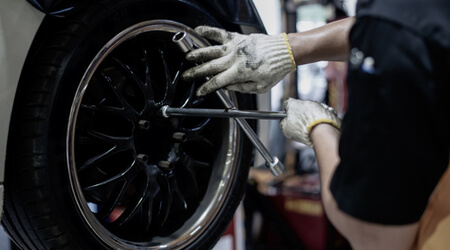
Even though South Carolina may be better known for its warm summer weather, many parts of the state can experience cold temperatures and icy conditions during the winter months. As a result, drivers in South Carolina should prepare their vehicles for colder weather and slippery conditions to prevent wintertime accidents.
If you’ve been injured in an accident in winter conditions in South Carolina, contact Joye Law Firm for a free case evaluation. We can discuss whether you may be entitled to compensation for injuries you suffered in the crash and how our firm may be able to help.
Get Your Car Serviced Now
At the beginning of winter, you can help avoid a potential breakdown or vehicle failure that can lead to an accident by having your vehicle serviced. A pre-winter service should include checking your oil to make sure it can keep your engine running optimally during colder temperatures. You should also have your vehicle parts and systems checked for leaks and other needed repairs and replacements, including tires and brakes.
Check Your Battery
Lower temperatures can reduce the efficiency of your vehicle’s battery. If your vehicle has an internal combustion engine, cooler temps can also require more power from your battery to get your vehicle started. Prior to or at the beginning of winter, you should have your vehicle’s battery checked out. Make sure your battery has sufficient voltage and your alternator is recharging your vehicle.
Check Your Cooling System
Many types of coolant can expand as the weather dips into freezing temperatures, potentially damaging your engine. You should ensure that your vehicle has sufficient coolant and that your coolant is designed to work in cold temperatures.
You should also have your vehicle’s cooling system examined for leaks, which may cause a potentially dangerous loss of coolant fluid or allow water into the system. Consider having your vehicle’s cooling system flushed if it hasn’t been done in several years, as coolant can break down and foreign particles like dirt and rust can get into the system.
Fill Your Windshield Washer Reservoir
South Carolina can receive freezing rain, sleet, and snow. You should ensure that your vehicle’s windshield washer fluid is topped off at the beginning of the winter. If you must drive in winter weather conditions, you may need to clean snow, ice, or road spray with dirt and salt from your windshield to have a clear view. Make sure that your wiper fluid is designed to work in colder temperatures.
Also, consider replacing your wiper blades, switching them out for ones able to handle winter conditions.
Finally, test your front and rear windshield defrosters to ensure they remain in good working order.
Inspect Your Tires
You should inspect the condition of your tires as the seasons change. Depending on where you live, you may consider getting snow/winter tires, which provide optimal performance even in colder temperatures or in snow/ice conditions.
Check the pressure of your tires to ensure that each tire has been filled to the manufacturer-recommended pressure. Make this check of your tire pressure when your vehicle hasn’t been driven for at least three hours. You can usually find the recommended pressure for your tires on your vehicle’s manufacturer’s website, in your owner’s manual, or on a placard located on the driver’s side door or the doorjamb pillar behind the driver’s seat.
Keep in mind that colder temperatures usually reduce the air pressure in your tires, so you may need to slightly inflate your tires to ensure optimal performance. However, also remember to check your tire pressure again in the spring as temperatures warm up so you can let out excess pressure.
Finally, remember to check your tire treads on a regular basis. If your tire treads have uneven wear, or if the treads measure less than 1/16 of an inch, you need to replace your tires. Ideally, you should replace all four tires on your car at the same time.
Check the Age of Your Tires
The performance and safety of tires can degenerate with time, even if you don’t drive your vehicle often. The sidewall of your tires will list the week and year that your vehicle was manufactured. Your owner’s manual or your vehicle’s or tire’s manufacturer website will recommend when your tires should be replaced regardless of visible condition.
Know Your Car
Every vehicle handles differently, especially in less-than-ideal conditions during winter weather. You can help avoid getting into an accident during the winter months by getting to know how your vehicle operates in colder weather. Practice driving in winter conditions in an empty parking lot during the daytime so you get a feel for how your vehicle handles. If you need to drive in slick conditions in the wintertime, drive slowly and give yourself more stopping distance than usual. Also, familiarize yourself with your vehicle’s braking system. Anti-lock brakes require firm, continuous pressure for an emergency stop, while standard braking systems require you to gently pump the brakes to avoid lock-up.
If you do lose control of your vehicle in slick winter conditions, the best way to regain control is to slowly take your foot off the accelerator while gently steering into the direction you want to go. Avoid stepping on the brakes or accelerator until you’ve regained control of your vehicle.
Plan Your Travel and Route
If you have to travel in winter weather conditions, you can help protect yourself from the risk of an accident by checking the road conditions. Leave earlier than you planned if necessary to give yourself enough time to get to your destination while driving in a safe manner and avoiding speeding. If possible, try to wait out bad weather or poor road conditions.
Make sure you know your route. If you need to check a map or turn on your navigation system, pull off the road to do so. Fill up your gas tank or fully charge an electric vehicle if going on a longer trip, in case you get stuck in traffic and need the extra fuel or battery power to keep your vehicle running.
Stock Your Vehicle
If you are expecting winter weather, you may want to stock your vehicle with emergency supplies, including:
- Ice scraper and brush to clean ice and snow off your vehicle
- Snow shovel
- Coarse sand or kitty litter in case you need to get your vehicle out of a low-traction situation
- Jumper cables
- Jack and either a spare tire or a tire repair kit
- First-aid kit
- Flares or hazard markers
- Flashlight
- Gloves
- Warm clothing or blankets (Mylar/space blankets store easily in vehicles)
- Food, water, and any medicine you take regularly
- Power brick to keep your cellphone charged
Learn What to Do in a Winter Emergency
If your car breaks down or you get in an accident during winter weather:
- Stay with your vehicle and call for help.
- Use flares, bright markers on the top of your vehicle, and passenger compartment lights to help keep your vehicle visible.
- If you must run your vehicle’s engine to stay warm, keep the exhaust pipe clear of snow, mud, or other obstructions, and only run the engine long enough to stay warm.
If you’ve been hurt in a car accident in South Carolina, contact the personal injury lawyers of Joye Law Firm. Reach out to us online or give us a call at 888-324-3100 for a free, no-obligation consultation to discuss the details of your case and to learn more about your legal options.



























